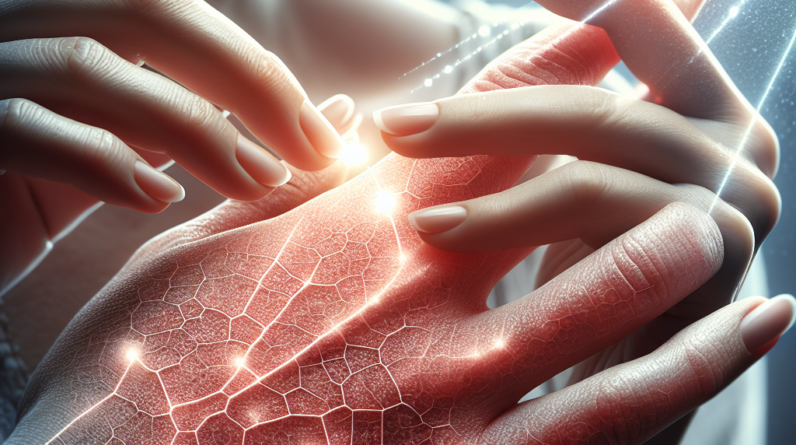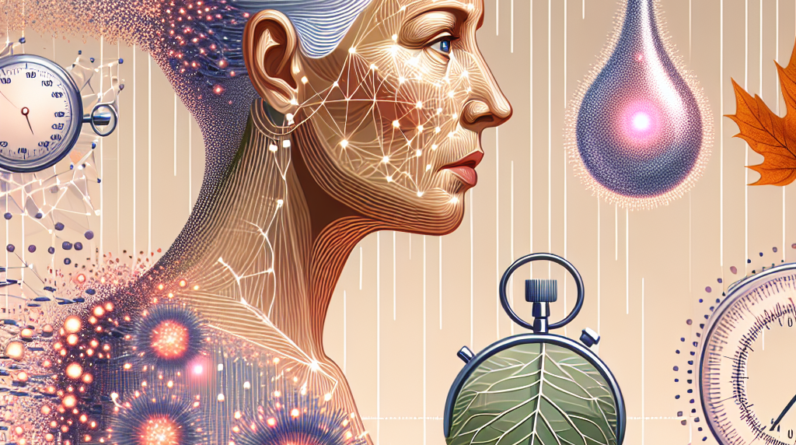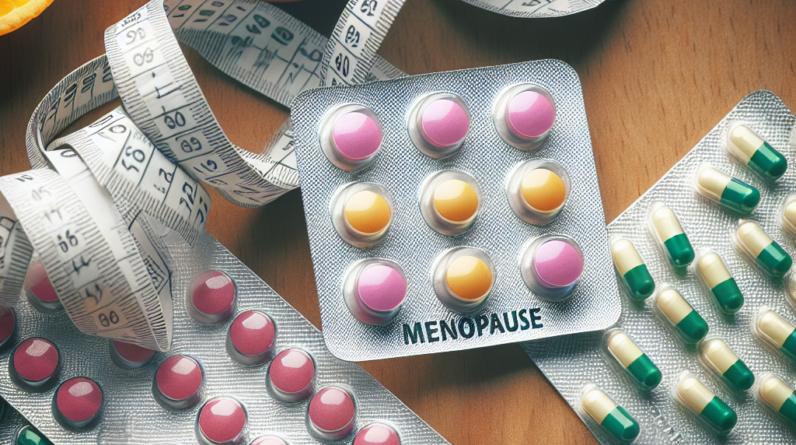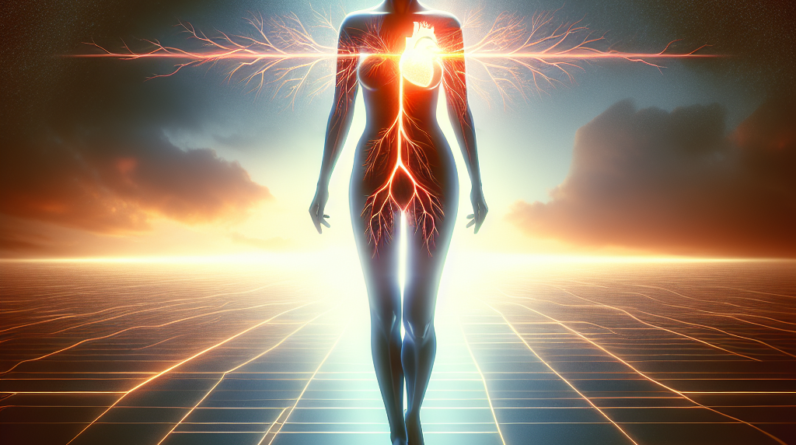
Menopause is a natural stage in a woman’s life that brings about various changes, both physically and emotionally. One common issue that many women experience during menopause is skin itching. This irritating sensation can range from mild to severe, and can greatly impact a woman’s daily life. In this article, we will explore the causes of menopause skin itching and provide effective tips on how to alleviate this discomfort, allowing you to navigate this stage of life with confidence and ease.

Causes of Menopause Skin Itching
Hormonal Changes
During menopause, the body goes through significant hormonal changes, particularly a decrease in estrogen levels. These hormonal fluctuations can have various effects on the body, including the skin. Estrogen is responsible for maintaining the skin’s moisture and elasticity, so a decline in estrogen levels can lead to dryness and itching.
Decreased Estrogen Levels
One of the primary causes of menopause skin itching is the decrease in estrogen levels. Estrogen plays a crucial role in maintaining the skin’s health and hydration. When estrogen levels drop, the skin may become dry, itchy, and more sensitive. The lack of estrogen also affects the production of collagen, leading to thinner and less elastic skin, which can contribute to itching.
Dry Skin
Dry skin is a common symptom of menopause and can lead to itching. As women age, the skin becomes less able to retain moisture and produce natural oils, causing it to become dry and rough. Dry skin is more prone to itching, especially when there is a lack of proper moisturization.
Decreased Collagen Production
Collagen is a protein that provides the skin with structure, elasticity, and firmness. During menopause, there is a decrease in collagen production, resulting in thinner and more fragile skin. This loss of collagen can contribute to itching, as the skin becomes more susceptible to dryness and irritation.
Symptoms of Menopause Skin Itching
Persistent Itching
One of the main symptoms of menopause skin itching is persistent itching that lasts for an extended period. This itching sensation can be uncomfortable and distracting, affecting daily activities and quality of life.
Redness and Irritation
Menopause skin itching can cause redness and irritation in the affected areas. The constant scratching and rubbing of the itchy skin can lead to inflammation, making the skin appear red and irritated.
Flaky or Scaly Skin
The dryness associated with menopause skin itching can result in the skin becoming flaky or scaly. This flakiness and scaliness are often accompanied by itching, as the skin tries to compensate for the lack of moisture.
Burning Sensation
Some women may experience a burning sensation along with the itching. The burning sensation can be attributed to the skin’s increased sensitivity due to the hormonal changes during menopause.
Common Areas Affected by Menopause Skin Itching
Face and Neck
Menopause skin itching commonly affects the face and neck area. The delicate skin in these regions is more prone to dryness and irritation, making it susceptible to itching.
Arms and Legs
The arms and legs are also frequently affected by menopause skin itching. These areas are often exposed to environmental factors and may experience decreased sebum production, leading to dryness and itchiness.
Chest and Back
Menopause skin itching can extend to the chest and back as well. The skin in these areas may become dry and itchy, causing discomfort and irritation.
Genital Area
The genital area may experience itching during menopause due to the hormonal changes affecting the skin’s moisture levels. Itching in this area can be particularly bothersome and may require special attention and care.
Impact of Menopause Skin Itching on Quality of Life
Sleep Disturbances
Dealing with menopause skin itching can disrupt sleep patterns and lead to sleep disturbances. The constant itching can make it challenging to fall asleep or stay asleep, causing fatigue and daytime sleepiness.
Mood Changes
The discomfort and frustration caused by menopause skin itching can lead to mood changes. Itching can be irritating and can affect a person’s emotional well-being, causing feelings of annoyance, irritability, or even sadness.
Social Embarrassment
Menopause skin itching can be embarrassing when it occurs in public settings. The urge to scratch the affected areas can be difficult to resist, potentially drawing unwanted attention and causing self-consciousness.
Decreased Self-esteem
The persistent itching and visible signs of skin irritation can impact self-esteem. Menopause skin itching may make individuals feel self-conscious about their appearance, leading to a decrease in self-confidence.

Tips for Managing Menopause Skin Itching
Moisturize Regularly
To combat dryness and alleviate itching, it is essential to moisturize the skin regularly. Use a moisturizer that is specifically formulated for dry or sensitive skin and apply it generously to the affected areas.
Avoid Hot Showers
Hot showers or baths can strip the skin of its natural oils and exacerbate dryness and itching. Opt for lukewarm water instead and limit your showers to a reasonable duration.
Use Gentle Cleansers
Choose mild, fragrance-free cleansers that are gentle on the skin. Harsh soaps and cleansers can disrupt the skin’s natural barrier and contribute to dryness and itching.
Avoid Irritating Fabrics
Avoid wearing rough or scratchy fabrics that can irritate the skin further. Opt for soft, breathable fabrics like cotton to minimize friction and allow the skin to breathe.
Use Hypoallergenic Products
Check labels and choose hypoallergenic skincare and laundry products to reduce the risk of irritation. These products are formulated to minimize allergic reactions and sensitivity.
Apply Cold Compresses
Applying cold compresses or ice packs to itchy areas can provide temporary relief. The cold temperature can numb the skin and alleviate itching and inflammation.
Stay Hydrated
Drinking an adequate amount of water throughout the day helps keep the skin hydrated from within. Well-hydrated skin is less prone to dryness and itching.
Wear Loose and Breathable Clothing
Tight-fitting or synthetic clothing can trap moisture and contribute to skin irritation. Opt for loose, breathable clothing made from natural fibers to allow air circulation and minimize friction.
Manage Stress Levels
Stress can worsen menopause symptoms, including skin itching. Engage in relaxation techniques, such as deep breathing exercises, meditation, or yoga, to manage stress levels and promote overall well-being.
Avoid Scratching
Resist the urge to scratch, as it can further irritate the skin and prolong the itching. Instead, try gentle patting or applying a cold compress to the itchy areas to relieve the sensation.
Medical Treatments for Menopause Skin Itching
Hormone Replacement Therapy
Hormone replacement therapy (HRT) may be prescribed to alleviate menopause symptoms, including skin itching. HRT replenishes the declining hormone levels, which can help improve skin hydration and reduce itching.
Topical Steroids
Topical steroid creams or ointments can provide relief from itching and inflammation. These medications work by reducing the skin’s immune response and suppressing inflammation.
Topical Antihistamines
Topical antihistamines are available in cream or gel form and can help relieve itching caused by allergic reactions or irritation. These products block the release of histamine, a chemical responsible for triggering itching.
Oral Antihistamines
Oral antihistamines may be recommended in cases of severe itching that is not adequately controlled by topical treatments. These medications can help reduce itchiness by blocking histamine receptors in the body.
Moisturizing Prescription Creams
In severe cases of menopause skin itching, a dermatologist may prescribe specially formulated moisturizing creams to restore moisture and relieve itching. These creams often contain skin-nourishing ingredients that help repair the skin barrier.
Prescription Anti-itch Medications
For persistent and severe itching, prescription oral medications specifically designed to alleviate itching may be prescribed. These medications work by targeting the neurological pathways responsible for transmitting itch signals.
Natural Remedies for Menopause Skin Itching
Aloe Vera Gel
Aloe vera gel has soothing and hydrating properties that can provide relief from itching. Apply a thin layer of pure aloe vera gel to the affected areas to soothe the itch and promote skin healing.
Coconut Oil
Coconut oil is a natural moisturizer that can help alleviate dryness and itching. Apply coconut oil to the affected areas to lock in moisture and soothe irritated skin.
Oatmeal Baths
Taking oatmeal baths can help provide relief from menopause skin itching. Add colloidal oatmeal or finely ground oats to your bathwater and soak for 15-20 minutes to soothe itchy skin.
Tea Tree Oil
Tea tree oil possesses antibacterial and anti-inflammatory properties, making it beneficial for relieving itching and reducing skin irritation. Dilute tea tree oil with a carrier oil and apply it to the itchy areas.
Calendula Cream
Calendula cream, derived from marigold flowers, has anti-inflammatory properties that can soothe itchy skin. Apply a thin layer of calendula cream to the affected areas to reduce itching and inflammation.
Chamomile Compresses
Chamomile is known for its anti-inflammatory and calming properties. Brew a strong chamomile tea, allow it to cool, and apply it as a compress to the itchy areas to relieve itching.
Vitamin E Oil
Vitamin E oil can aid in moisturizing and nourishing dry, itchy skin. Apply vitamin E oil to the affected areas to help alleviate itching and promote skin healing.
Probiotics
Certain probiotics, specifically Lactobacillus rhamnosus and Lactobacillus fermentum, have shown potential in improving skin health and reducing itching. Incorporate probiotic-rich foods or supplements into your diet.
Essential Fatty Acids
Essential fatty acids, such as omega-3 and omega-6 fatty acids, can help improve skin health and reduce inflammation. Incorporate foods rich in these fatty acids, such as fatty fish, flaxseeds, and walnuts, into your diet.
Staying Active
Regular physical activity can promote overall well-being, including skin health. Exercise improves blood circulation, which helps deliver nutrients and oxygen to the skin, keeping it healthy and less prone to itching.
Menopause-related Lifestyle Changes to Reduce Skin Itching
Maintain a Healthy Diet
Eating a balanced diet can support skin health during menopause. Incorporate fruits, vegetables, whole grains, lean proteins, and healthy fats into your meals to provide essential nutrients for skin health.
Exercise Regularly
Engaging in regular physical activity can help improve blood flow and promote healthy skin functioning. Aim for at least 30 minutes of moderate-intensity exercise most days of the week.
Avoid Smoking and Alcohol
Smoking and excessive alcohol consumption can exacerbate menopause symptoms and contribute to skin dryness and itching. Quit smoking and limit alcohol intake to support overall skin health.
Practice Stress Management Techniques
Stress can worsen menopause symptoms, including skin itching. Practice stress management techniques such as deep breathing exercises, meditation, or engaging in hobbies to reduce stress levels.
Keep Skin Hydrated
Maintaining skin hydration is crucial for reducing itchiness. Drink plenty of water throughout the day and use moisturizers to keep the skin hydrated and prevent dryness.
Limit Exposure to Environmental Irritants
Environmental factors, such as harsh weather conditions, pollution, and irritating chemicals, can worsen menopause skin itching. Limit exposure to these irritants by protecting the skin with appropriate clothing and using gentle, hypoallergenic skincare products.
When to Seek Medical Attention for Menopause Skin Itching
Severe and Prolonged Itching
If the itching becomes severe and persists despite self-care measures, it is advisable to seek medical attention. A healthcare provider can evaluate the underlying causes of the itching and recommend appropriate treatment options.
Presence of Open Sores or Infections
If the itching leads to open sores or skin infections, it is essential to seek medical attention promptly. Open sores can increase the risk of infection, which may require medical intervention.
Failure of Self-care Measures
If self-care measures and over-the-counter remedies do not provide relief from menopause skin itching, consulting a healthcare professional is recommended. They can assess the condition and suggest alternative treatment options.
Impact on Daily Activities
If menopause skin itching significantly affects daily activities and quality of life, seeking medical attention is crucial. A healthcare provider can offer guidance and prescribe suitable treatments to alleviate the itching and improve overall well-being.
Preventing Future Skin Itching after Menopause
Maintaining Good Skin Hygiene
Maintaining good skin hygiene is essential for preventing skin itching after menopause. Keep the skin clean and moisturized, and avoid using harsh soaps or cleansers that can dry out the skin.
Following a Healthy Lifestyle
Following a healthy lifestyle can support skin health and reduce the risk of itching. Eat a balanced diet, exercise regularly, and avoid smoking and excessive alcohol consumption.
Regular Skin Examinations
Perform regular skin examinations to identify any changes or abnormalities. Check for dry or itchy areas and seek medical attention if necessary.
Consulting with Dermatologists
Regularly consulting with a dermatologist can help monitor skin health and address any concerns. A dermatologist can provide guidance on proper skincare routines and recommend treatments for menopause skin itching.
By understanding the causes, symptoms, and management techniques for menopause skin itching, individuals can reduce discomfort and improve their overall quality of life during this transitional phase. With proper care and attention, skin itching can be effectively managed, allowing women to embrace menopause with confidence and comfort.







